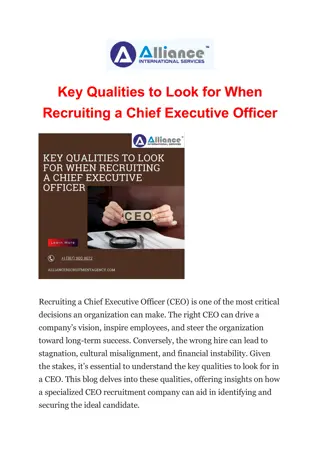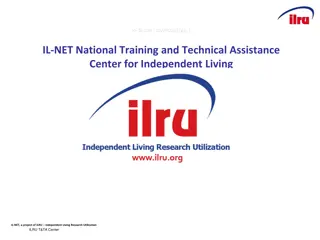
Key Qualities to Look for When Appointing an Independent Director
Discover the key qualities of an independent director, from ethical integrity to strategic vision, fostering accountability, diversity, and corporate growth.
Download Presentation

Please find below an Image/Link to download the presentation.
The content on the website is provided AS IS for your information and personal use only. It may not be sold, licensed, or shared on other websites without obtaining consent from the author. If you encounter any issues during the download, it is possible that the publisher has removed the file from their server.
You are allowed to download the files provided on this website for personal or commercial use, subject to the condition that they are used lawfully. All files are the property of their respective owners.
The content on the website is provided AS IS for your information and personal use only. It may not be sold, licensed, or shared on other websites without obtaining consent from the author.
E N D
Presentation Transcript
Key Qualities to Look for When Appointing an Independent Director In the evolving corporate landscape, the role of an independent director has become indispensable for organizations seeking toenhance governance, foster accountability, and drive strategic growth. For companies, whether established enterprises or burgeoning startups, appointing the right director is a critical decision that can significantly impact their trajectory. This article explores the key qualities to look for when making this pivotal appointment. 1. Strong Ethical Compass An independent director s foremost responsibility is to uphold the integrity and ethical standards of the organization. They act as impartial custodians, ensuring that decisions align with legal compliance and moral principles. A strong ethical foundation enables them to navigate complex scenarios, address potential conflicts of interest, and maintain stakeholder trust. Organizations should look for individuals who have demonstrated unwavering commitment to ethical practices in their professional careers. This quality is particularly vital as it underpins the trust and objectivity that define the role of a director.
2. Deep Industry Knowledge An effective independent director brings a heap of expertise and insights relevant to the company s sector. Their experience allows them to provide informed guidance on industry trends, regulatory changes, and competitive dynamics. This knowledge ensures that the board s decisions are well- grounded and strategically aligned with market realities. When evaluating candidates, companies should prioritize individuals with a proven track record of leadership and innovation in their respective industries. Their ability to connect broader market shifts with organizational strategy adds immense value to board discussions. 3. Financial Acumen Financial literacy is another essential quality for an independent director. As key participants in overseeing financial reporting and auditing processes, they must be capable of analyzing complex financial statements, identifying risks, and ensuring transparency. A candidate with a background in finance, accounting, or corporate governance can effectively monitor the organization s fiscal health and safeguard shareholder interests. This expertise is especially critical in times of financial uncertainty or when navigating major transactions. 4. Strong Communication Skills The ability to articulate ideas clearly and constructively is crucial for an independent director. Boardroom dynamics often involve diverse perspectives, and effective communication helps bridge differences and
drive consensus. The director must also be a good listener, capable of understanding various viewpoints and asking the right questions to uncover deeper insights. The type of communication adapted affects the collaborative environment of the organization. Not only the independent director, each and every employee bonds over and proactively participates in the functioning of the organization. 5. Objectivity and Independence True independence is a cornerstone of this role. The director should not have anyfinancial or personalties to the organization that could compromise their objectivity. This ensures that their decisions are unbiased and solely in the interest of the company and its stakeholders. Companies must conduct thorough background checks and assess potential conflicts of interest to ensure the appointed individual can genuinely fulfill the independent mandate. 6. Strategic Vision A forward-looking perspective is a critical asset for any independent director. Beyond governance and compliance, they should contribute to shaping the company s strategic direction. Their ability to think beyond immediate challenges and anticipate future opportunities or risks is invaluable.
These directors with strategic acumen can offer fresh ideas, challenge conventional thinking, and help the organization adapt to changing environments. Their role in crafting long-term goals ensures sustained growth and resilience. 7. Crisis Management Expertise In times of organizational turbulence, the director often plays a stabilizing role. Their ability to remain calm under pressure, provide sound advice, and guide the board through crises is an essential quality. Whether dealing with financial downturns, reputational damage, or leadership transitions, the director s experience in crisis management can mitigate risks and restore confidence among stakeholders. 8. Commitment to Diversity and Inclusion Boards are increasingly recognizing the importance of diversity in driving innovation and better decision- making. An independent director who values and promotes diversity can bring fresh perspectives and foster an inclusive culture within the organization. Such individuals understand the significance of representation and are equipped to challenge biases, ensuring that the board reflects a broad spectrum of experiences and viewpoints. 9. Willingness to Invest Time and Effort The role of the director requires a significant commitment of time and energy. From attending board meetings to reviewing documents and staying updated on industry developments, the demands are substantial. A dedicated director will prioritize their responsibilities and remain fully engaged. Before appointing the director, companies should ensure that the candidate can devote the necessary time and attention to fulfilling their duties effectively. 10. Collaborative Spirit
While independence is vital, the ability to work collaboratively with other board members and executives is equally important. An independent director must balance providingconstructive criticismwith building positive relationships. Their collaborative approach should encourage open dialogue, foster mutual respect, and contribute to a cohesive and productive board environment. Conclusion Appointing an independent director is not just a regulatory requirement but a strategic decision that can profoundly influence a company s success. The right director brings ethical integrity, industry expertise, financial acumen, and a strategic vision to the table. They act as a stabilizing force in crises, a champion for diversity, and a guardian of stakeholder interests. Uncover the latest trends and insights with our articles onVisionary Vogues






















